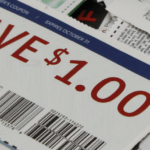
There’s a new effort to stop coupon counterfeiters in their tracks. And if it also helps keep your coupons from having to be sent to Mexico, and paves the way for more retailers to be able to accept mobile manufacturer’s coupons by scanning a bar code on your phone – all the better.
OLS Payments, a division of InComm Payments, has partnered with Intelligent Clearing Network in an effort to catch counterfeit coupons at the checkout as they’re scanned, instead of weeks or months later. It’s the latest industry initiative aimed at thwarting coupon fraudsters, while working to improve upon an outmoded method of validating and reimbursing retailers for the coupons you use.
“The industry all of a sudden is saying, hey, this is great, we need to do this,” ICN Chief Operating Officer Rich Thibedeau told Coupons in the News, about the recent interest in modernizing the coupon acceptance process. “But ICN has been doing this a long time” – and now its new partner could help implement its solution in many more stores.
Right now, if a counterfeiter creates or manipulates a coupon bar code that can be scanned at the checkout, chances are it’s going to be accepted. And it won’t be caught and identified as a counterfeit until it’s sent to one of the major coupon processing plants just over the border in Mexico. By then, the counterfeit coupon user is long gone with their illicit discount, and the manufacturer or retailer has to eat the loss, which could make them more reluctant to issue or accept legitimate coupons in the future.
ICN’s technology checks the validity of a coupon as it’s scanned instead of after the fact, instantly checking it against a positive offer file of known legitimate coupons, and a negative offer file of known counterfeits. Retailers just need to allow their checkout system to connect to ICN’s servers.
But “what we’ve seen from retailers is that less than 2% of all transactions have a paper coupon within that transaction,” Thibedeau said. So even though the technology is there to check the legitimacy of coupons as they’re scanned, some retailers think it’s not worth the trouble connecting to a third-party coupon validator, for the sake of a relatively small percentage of transactions – even though that small percentage could add up to hundreds of millions of dollars a year lost to coupon fraud.
The partnership with InComm takes advantage of connectivity that’s already there. InComm’s systems validate gift cards and prepaid products that you purchase in stores – when a retailer scans a card, their system connects to InComm’s servers to validate it. Now, retailers that are already connected to InComm can use that same communication path to validate coupons with ICN – vastly expanding the potential number of stores that can check the validity of your coupons on the spot.
“The bottleneck to this industry has always been those retailer integrations,” Matt Fitzgerald, OLS Payments Director of Offer Product Strategy, told Coupons in the News. The new partnership helps clear that hurdle.
So what does this mean for shoppers? In addition to thwarting counterfeiters, and helping to ensure there are more legitimate offers available for honest coupon users, validating coupons as they’re scanned makes the whole coupon processing system more efficient – and helps pave the way for the very future of couponing.
Once retailers can check the legitimacy of paper coupons at the checkout, “there’s really no reason to send these things to Mexico anymore for processing,” Fitzgerald explained. “Because the main reason why these coupons are being sent to Mexico is to check for fraud.”
Then, if retailers don’t have to produce physical copies of coupons anymore in order to get reimbursed by manufacturers, that could help clear the way for them to begin accept paperless mobile manufacturer’s coupons on your phone.
And it all starts with stopping paper coupon fraud. Once retailers can trust that every coupon they accept is legitimate, and that they’ll be reimbursed for every one of those coupons, they could become more willing to accept mobile coupons without fear of falling for frauds. “That’s what we are implementing,” Fitzgerald said. “It is an organic path to get to mobile, and is actually going to solve the problem that exists, of why mobile coupons aren’t allowed in the first place.”
So there’s a lot more to fighting coupon fraud, than just stopping coupon fraud itself. The hope is that solving one problem, will eliminate barriers to solving other problems. And then the whole process of issuing, using and accepting coupons of all types could become a whole lot easier for everyone. Except maybe the counterfeiters.
Image source: cpyles















